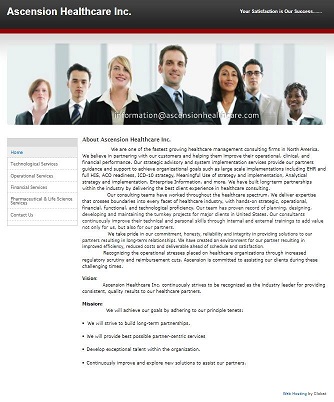WIPO Arbitration and Mediation Center
ADMINISTRATIVE PANEL DECISION
Ascension Health Alliance v. Prateek Sinha, Ascension Healthcare Inc.
Case No. D2018-2775
1. The Parties
Complainant is Ascension Health Alliance of St. Louis, Missouri, United States of America (“United States”), represented by Armstrong Teasdale, LLP, United States.
Respondent is Prateek Sinha, Ascension Healthcare Inc. of Edison, New Jersey, United States.
2. The Domain Name and Registrar
The disputed domain name <ascensionhealthcare.com> is registered with Domain.com, LLC (the “Registrar”).
3. Procedural History
The Complaint was filed with the WIPO Arbitration and Mediation Center (the “Center”) on December 4, 2018. On December 5, 2018, the Center transmitted by email to the Registrar a request for registrar verification in connection with the disputed domain name. On December 5, 2018, the Registrar transmitted by email to the Center its verification response confirming that Respondent is listed as the registrant and providing the contact details.
The Center verified that the Complaint satisfied the formal requirements of the Uniform Domain Name Dispute Resolution Policy (the “Policy” or “UDRP”), the Rules for Uniform Domain Name Dispute Resolution Policy (the “Rules”), and the WIPO Supplemental Rules for Uniform Domain Name Dispute Resolution Policy (the “Supplemental Rules”).
In accordance with the Rules, paragraphs 2 and 4, the Center formally notified Respondent of the Complaint, and the proceedings commenced on December 13, 2018. In accordance with the Rules, paragraph 5, the due date for Response was January 2, 2019. Respondent did not submit any response. Accordingly, the Center notified Respondent of Respondent’s default on January 3, 2019.
The Center appointed Lawrence K. Nodine as the sole panelist in this matter on January 11, 2019. The Panel finds that it was properly constituted. The Panel has submitted the Statement of Acceptance and Declaration of Impartiality and Independence, as required by the Center to ensure compliance with the Rules, paragraph 7.
4. Factual Background
Complainant is a large non-profit healthcare organization in the United States. Formed in 1999, Complainant operates in over 1,500 locations with over 90 hospitals in the country. For nearly two decades, Complainant has used the mark ASCENSION in connection with healthcare and insurance services. Complainant owns at least 19 trademark registrations for ASCENSION-formative marks, including several ASCENSION word and design marks (such as United States trade mark registration number 2478534, registered on August 14, 2001), as well as several ASCENSION HEALTH word and design marks (collectively, “the ASCENSION Marks”) in the United States.
Respondent registered the disputed domain name <ascensionhealthcare.com> on June 24, 2013. The website located at the disputed domain name (see below) indicates that Respondent is a healthcare management consulting firm.

5. Parties’ Contentions
A. Complainant
Complainant asserts that it has rights in the ASCENSION Marks through its trademark registrations and that the disputed domain name is identical to Complainant’s ASCENSION Marks. Complainant asserts that Respondent’s use of the disputed domain name has created a likelihood of confusion with Complainant’s ASCENSION Marks. In addition, Complainant contends that Respondent has no rights or legitimate interests with respect of the disputed domain name because Complainant has national trademark rights in ASCENSION. Complainant maintains that the services provided by Respondent are identical to Complainant’s services. Complainant further asserts that the disputed domain name was registered and is being used in bad faith, as evident by Respondent’s failure to respond to Complainant’s communications.
B. Respondent
Respondent did not reply to Complainant’s contentions.
6. Discussion and Findings
A. Identical or Confusingly Similar
Complainant’s trademark registrations establishes Complainant’s rights in the ASCENSION Marks. Complainant’s marks are recognizable within the disputed domain name, which fully incorporates the ASCENSION and ASCENSION HEALTH marks as well as the dominant portion of the ASCENSION-formative marks. The inclusion of the term “care” does not alleviate the confusingly similarity.
The Panel finds that Complainant has satisfied paragraph 4(a)(i) of the Policy.
B. Rights or Legitimate Interests
Complainant has failed to make out a prima facie case of Respondent’s lack of rights or legitimate interests in the disputed domain name. The website to which the disputed domain name resolves appears to offer bona fide healthcare-related services. Indeed, Complainant contends that Respondent provides healthcare management services that are “very similar, if not identical” to those offered by Complainant, but Complainant does not contend that Respondent is offering counterfeit or deceptive services. The base line fact is that Complainant appears to concede that Respondent is in fact offering a real world service via the disputed domain name. Moreover, Complainant has neither alleged nor proved that Respondent imitates Complainant when it offers these services. Although Complainant may have the starting ingredients of an ordinary, trademark infringement case against Respondent, the Complainant has not demonstrated to the satisfaction of the Panel that Respondent is not making a bona fide offering of services. The UDRP is not appropriate to resolve such ordinary trademark infringement claims, which would be better resolved by a court of competent jurisdiction.
Thus, Complainant has not satisfied paragraph 4(a)(ii) of the Policy.
C. Registered and Used in Bad Faith
In light of the Panel’s finding under paragraph 4(a)(ii) of the Policy, it is not necessary to make a finding under this element.
7. Decision
For the foregoing reasons, the Panel denies the Complaint.
Lawrence K. Nodine
Sole Panelist
Date: January 25, 2019